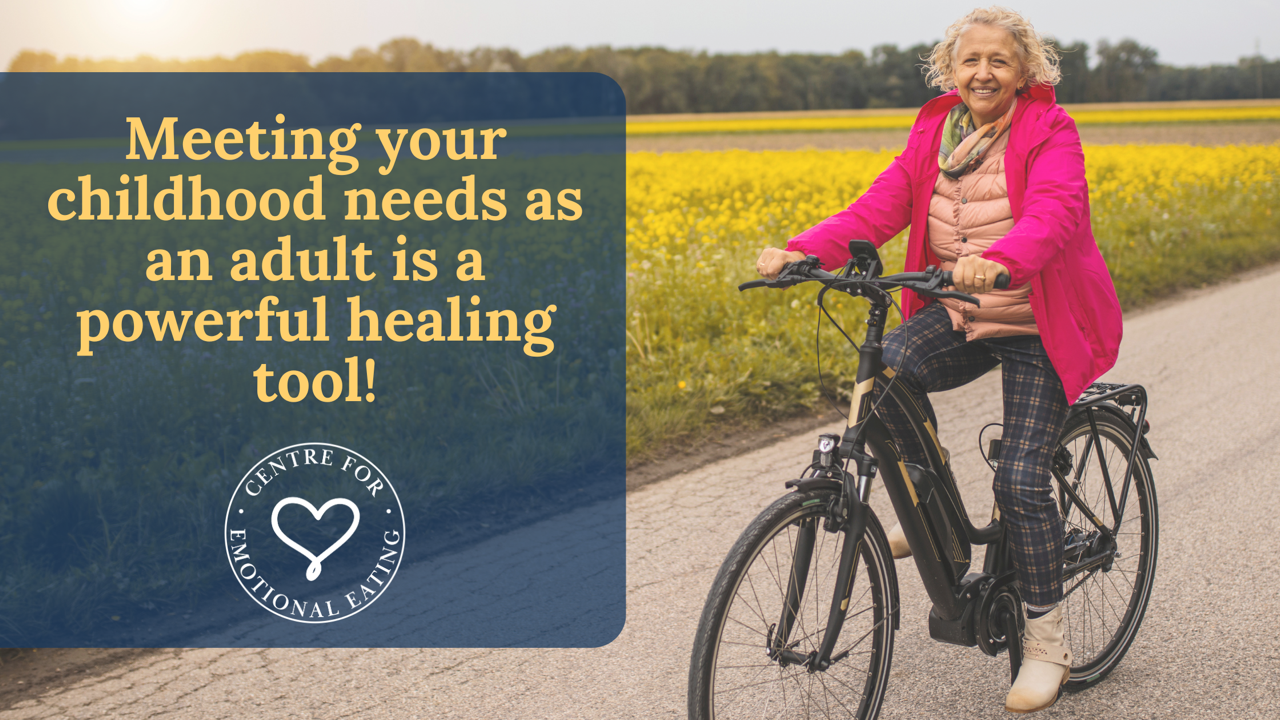Reparenting: Learning to Support the Younger You

Often here at the Centre for Emotional Eating we talk about how your patterns and habits with food are influenced not by the cravings themselves, but the root cause behind what makes you act.
For many, the root cause can be found in childhood or adolescent experiences. This is because as our brains and bodies grow, we are learning and are influenced by examples displayed around us—to finish what’s on our plate, diet talk, stuffing down emotions, just to name a few. We learn from parents, caregivers, teachers, coaches, siblings, and friendship circles! But not all of these lessons will serve you as you grow into your own adulthood, some might be downright painful or destructive.
It is incredibly common to reach a point in your adult life and know things need to change but not know how. This is where therapy can be a very helpful tool in helping you sort through your thoughts and feelings, gain confidence to make your own decisions, and help you feel more resilient.
And one effective tool I help clients with is how to learn to self-parent, or reparent, yourself. While your parents, or the caregivers you grew up with, were mostly doing the best they could with the resources they had, that doesn’t mean they were meeting all of your needs. This is where you, as an adult, can give yourself what younger you needed.
Here are some common ways to self-parent:
Giving Comfort
Right now, you might feel like food is the only way to give yourself comfort, and that is ok. Food is always there for you and that can feel secure (see the next one for why that is!). As you feel comfortable, start experimenting with other ways you might meet this need. Did you crave hugs as a kid but didn’t get them? Communicate to your partner that you want more contact, snuggle with your dog, or try getting a massage or manicure. Human touch is incredibly healing and supportive. Or maybe your household was noisy and overstimulating as a child. Try carving out quiet time to yourself, like a walk outside or slow down cleansing your face at night.
Showing Up
If you often felt dismissed as a kid or wanted a caregiver to show up for you at a school event, a dance recital, or a hockey game, know you are not alone in this experience. Absent parents can be physically removed from you and/or emotionally distant, and this can leave you feeling unloved (and may be showing up in how you act in your adult relationships). Showing up for yourself every day is a practice in learning to trust yourself (after you couldn’t trust you parent) that can look like doing the difficult work on yourself, living in alignment with your values, and prioritising your needs. Know that showing up for yourself can be both soothing—like warm meals and soft clothes—and sometimes a little uncomfortable—like saving money for the future or saying “no” to things you don’t want to do.
Granting Permission to Play
If you had to take on adult responsibilities, like taking care of younger siblings or an ill parent, you can feel like you missed out on ‘normal’ experiences growing up. This can look like missing out on birthday parties or even being told to stay quiet while a parent was sick. As an adult, give yourself these experiences you were missing. Laugh loudly in your home watching a TV show with the volume up, take yourself to the beach, cycle around the neighbourhood on your bike. If you feel up to it, make a list and cross them off regularly and see how much joy you bring into your life (and then keep doing the ones that make you smile)!
💛 Your peace awaits.


